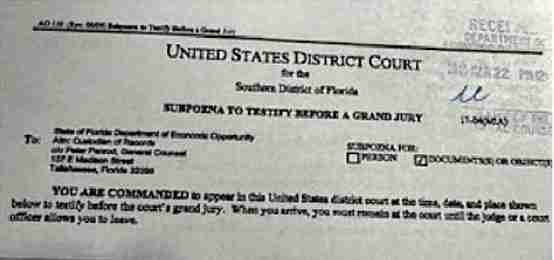Miami federal grand jury subpoena served on florida’s department of economic opportunity.
PHOTO COURTESY OF CLERK, US COURTS
By DAN CHRISTENSEN
FloridaBulldog.org
MIAMI – A Miami federal grand jury has subpoenaed records from Gov. Rick Scott’s administration and Pompano Beach about an aborted economic incentives deal with a U.S. manufacturer of Russian-style Kalashnikov assault rifles.
The subpoenas, served last week, were accompanied by a letter signed by Assistant U.S. Attorney Michael R. Sherwin announcing the existence of “an official investigation of a suspected federal offense.”
The suspected offense was not specified. But Florida Bulldog has reported that the company, RWC Group LLC, whose brand name is Kalashnikov USA, may be operating in violation of U.S. economic sanctions imposed on Russian-made military assault weapons.
Bloomberg Business later reported that “a complicated web of shell companies connects Kalashnikov USA to allies of Russian President Vladimir Putin and appears designed to avoid U.S. sanctions.”
The subpoena to the state was served on the Florida Department of Economic Opportunity (DEO) in Tallahassee, which oversees the state’s Qualified Target Industry tax-refund program. It demanded copies of all documents, materials and correspondence submitted by or pertaining to RWC, which stands for Russian Weapon Company.
DEO is Gov. Scott’s government agency for economic development. He appoints its executive director, who serves at his pleasure.
Project 762 The subpoena to Pompano Beach seeks similar copies pertaining to “Project 762” and the “Project 762 Incentive Package.” Project 762 was the code name used by the city, Broward County and the pro-business Greater Fort Lauderdale Alliance to refer to RWC/Kalashnikov in various public records.
Like Pompano Beach, Broward County was local government a sponsor of RWC/Kalashnikov. Unlike Pompano Beach, however, Broward has not received a subpoena in the matter.
Greater Fort Lauderdale Alliance spokesman Ron Drew declined to say whether his organization had been subpoenaed. “Our policy is to not discuss potential litigation,” he said.
Prosecutor Michael Sherwin did not respond to a request for comment.
Florida’s use of taxpayer funds to import to Broward an assault-rifle maker tied to Russia’s most recognizable weapons brand has come under scrutiny since the Valentine’s Day shooting at Parkland’s Marjory Stoneman Douglas High School that left 17 students and faculty dead. The shooter used an assault weapon.
President Barack Obama imposed the U.S. sanctions on a number of Russian arms makers in July 2014 after Russia did not end the Ukraine conflict. One of those companies was Concern Kalashnikov, maker of the notorious AK-47 assault rifle, whose U.S. assets were frozen and transactions with it were generally prohibited. At the time, RWC Group was Concern Kalashnikov’s exclusive U.S. dealer. After the sanctions, the U.S. company said it had severed all ties with Concern Kalashnikov. Tax breaks for jobs It was against that backdrop that Gov. Scott’s administration offered RWC Group $162,000 in state tax breaks in 2015 to bring the company, and its jobs, to South Florida from Pennsylvania.
The DEO released a copy of the federal subpoena Monday. To date, however, it has made only a limited release of information about the RWC deal, which was terminated in 2016 without any money being paid because the company failed to create the promised jobs. The still-hidden records might show whether the state investigated to determine if RWC Group had in fact severed all ties to its Moscow-based partner.
Scott’s office has denied that Florida skirted the sanctions to make the incentives offer to Kalashnikov USA. A spokesman said all eligible American companies that qualify for state tax incentives get offered them.
Broward court filings suggest the company did not cut all its ties. In December 2016 an attorney representing the company in a business dispute said Kalashnikov USA held the U.S. license to manufacture and sell Kalashnikov firearms.
“Under U.S. sanctions law, if a company is engaging in any transaction with a blacklisted entity like Kalashnikov, including licensing its name, technology or services for use in the U.S. or otherwise dealing in its property, that’s a compliance problem,” Washington, D.C. lawyer Robert L. Meltzer, who specializes in economics sanctions law, told Florida Bulldog this month.













No Comment